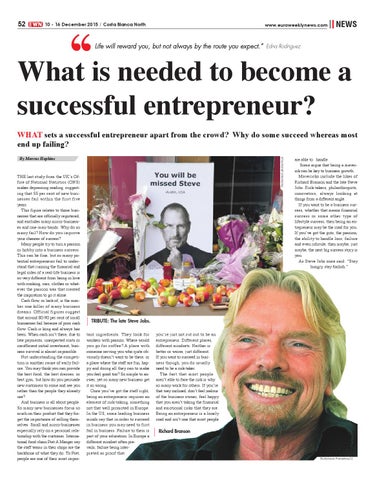52
E W N 10 - 16 December 2015 / Costa Blanca North
www.euroweeklynews.com
Life will reward you, but not always by the route you expect.”
NEWS
Edna Rodriguez
What is needed to become a successful entrepreneur? WHAT sets a successful entrepreneur apart from the crowd? Why do some succeed whereas most end up failing?
THE last study from the UK’s Office of National Statistics (ONS) makes depressing reading, suggesting that 55 per cent of new businesses fail within the first five years. This figure relates to those businesses that are officially registered, and excludes many micro-businesses and one-man-bands. Why do so many fail? How do you improve your chances of success? Many people try to turn a passion or hobby into a business success. This can be fine, but so many potential entrepreneurs fail to understand that running the financial and legal sides of a real-life business is so very different from being in love with cooking, cars, clothes or whatever the passion was that created the inspiration to go it alone. Cash flow, or lack of, is the number one killer of many business dreams. Official figures suggest that around 80-90 per cent of small businesses fail because of poor cash flow. Cash is king and always has been. When cash isn’t there, due to late payments, unexpected costs or insufficient initial investment, business survival is almost impossible. Not understanding the competition is another cause of early failure. You may think you can provide the best food, the best dresses, or best gym, but how do you persuade new customers to come and see you rather than the people they already use? And business is all about people. So many new businesses focus so much on their product that they forget the importance of selling themselves. Small and micro-businesses especially rely on a personal relationship with the customer. International food chain Pret A Manger say the staff teams in their shops are the backbone of what they do. To Pret, people are one of their most impor-
Shutterstock photocritical
By Marcus Hopkins
are able to handle. Some argue that being a maverick can be key to business growth. Mavericks include the likes of Richard Branson and the late Steve Jobs. Risk-takers, philanthropists, innovators, always looking at things from a different angle. If you want to be a business success, whether that means financial success or some other type of lifestyle success, then being an entrepreneur may be the road for you. If you’ve got the guts, the passion, the ability to handle loss, failure and even ridicule, then maybe, just maybe, the next big success story is you. As Steve Jobs once said: “Stay hungry, stay foolish.”
TRIBUTE: The late Steve Jobs. tant ingredients. They look for workers with passion. Where would you go for coffee? A place with someone serving you who quite obviously doesn’t want to be there, or a place where the staff are fun, happy and doing all they can to make you feel good too? So simple to answer, yet so many new business get it so wrong. Once you’ve got the staff right, being an entrepreneur requires an element of risk-taking, something not that well promoted in Europe. In the US, some leading business minds say that in order to succeed in business you may need to first fail in business. Failure to them is part of your education. In Europe a different mindset often prevails, failure being interpreted as proof that
you’re just not cut out to be an entrepreneur. Different places, different mindsets. Neither is better or worse, just different. If you want to succeed in business though, you do usually need to be a risk-taker. The fact that most people aren’t able to face the risk is why so many work for others. If you’re that way inclined, don’t feel jealous of the business owner, feel happy that you aren’t taking the financial and emotional risks that they are. Being an entrepreneur is a lonely road and isn’t one that most people
Richard Branson
Shutterstock Prometheus72
